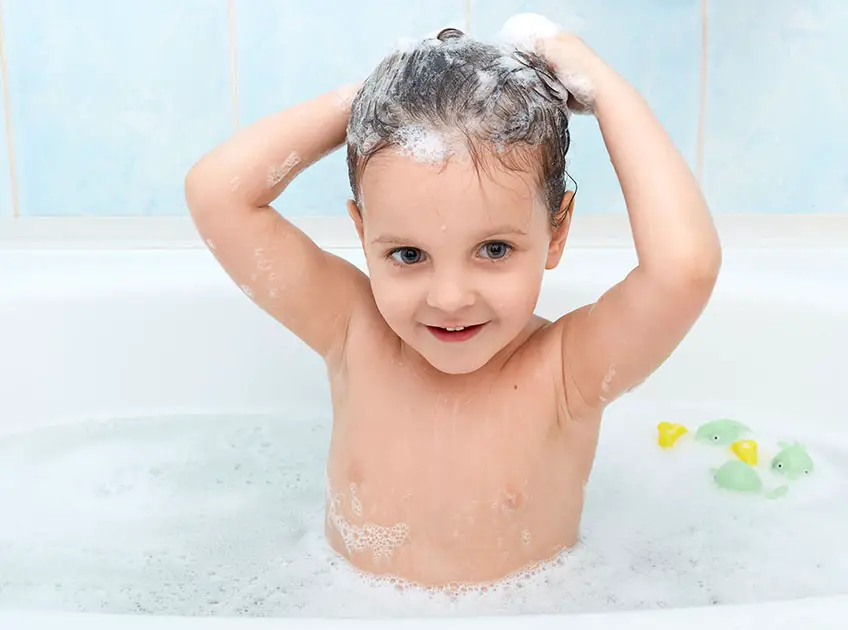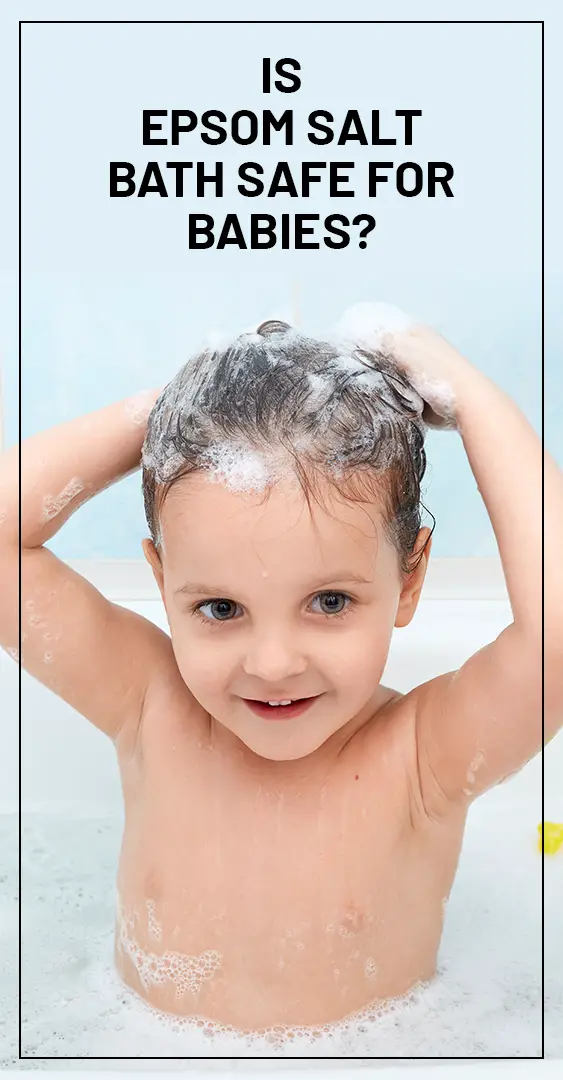
Important: This article is for informational purposes only. Please read our full disclaimer for more details.
Epsom salt is believed to have therapeutic and medicinal properties; however, the benefits are largely anecdotal. It is why new mothers often ask- ‘is Epsom salt safe for babies?’
Epsom salt is used for muscle relaxation, body rejuvenation, and relief from pain, aches, and stress. Still, when trying Epsom salt for babies, being double sure is essential to ensure that there will be no negative impacts of using it. Thorough knowledge of Epsom salt, its safety and benefits for the baby, and how Epsom salt bath works are vital.
Continue reading to get answers to all these questions.
What Is Epsom Salt?
Epsom salt is a water-soluble chemical compound consisting of magnesium, sulfur, and oxygen. It is largely used by Traditional Chinese Medicine (TCM) to overcome certain medical issues related to inflammation. Although this alternate medicine has spoken very high about Epsom salt, little research about its benefits makes it questionable.
Is Epsom Salt Safe For Babies?
Epsom salt is safe for babies only when used properly and under the guidance of some expert. Here, it is essential to know that excessive use of Epsom salt could be dangerous and potentially adversely affect the baby.
Therefore, consulting a certified alternative medicine expert is essential before using Epsom salt. It will help you know and understand how to have an Epsom salt bath for babies and what quantity of Epsom salt should be used depending upon the baby’s health and age. At the same time, it is important to use Epsom salt from trusted brands to ensure it is likely safe for babies.
How Does Epsom Salt Bath Work?
Epsom salt is water soluble. As soon the salt dissolves, it releases sulfate and magnesium ions in the water. When the body soaks in this water, the skin absorbs these ions that are believed to be beneficial for babies.
Even though little research on transdermal absorption of magnesium and sulfate ions is there, based on anecdotal evidence, it is used to offer some benefits.
What Are The Benefits Of Epsom Salt For Babies?
Under the supervision of experts, Epsom salt can offer the following benefits to the baby-
1. Exfoliates Skin- Epsom salt bath helps to remove the dead skin from the body and improve the skin’s texture.
2. Offers Antipruritic Or Anti-itch Effects- Epsom salt is believed to alleviate reasons that cause skin irritation or itching. It relieves sunburn, bug bites, skin rashes, diaper rashes, swimmer’s itch, psoriasis, eczema, and other skin issues.
3. Relaxes Muscles And Provides Relief From Pain- Epsom salt widens the blood vessels and thus promotes blood flow. It helps to relax the muscles. At the same time, Epsom salt has anti-inflammatory properties that can help to reduce swelling and alleviate aches and cramps.
4. Helps To Get A Sound Sleep- New mothers can understand how difficult it sometimes gets to get a baby into a sound sleep. But, neuropathic practitioners believe that an Epsom salt bath helps to relax the mind, that in turn helps to promote good sleep. Epsom salt contains magnesium that stimulates melatonin production- a sleep-inducing hormone. Still, this needs to be clinically proven.
How To Prepare An Epsom Salt Bath For Babies?
For an Epsom salt bath, a particular quantity of Epsom salt is dissolved in warm water. The quantity of salt is based on the baby’s age, weight, and health.
Usually, two cups are suitable for a standard-size bathtub for soaking the baby. However, the quantity will vary if you want to soak only certain parts. For instance, for soaking a baby’s feet or toenails, only two teaspoons of Epsom salt will suffice in 0.5 gallons of warm water. An appropriate dilution ratio is important for maximum benefits.
What Precautions Should You Take While Epsom Salt Bath For Babies?
Even though Epsom salt bath is considered safe for babies, you need to take certain precautions that will ensure the baby’s safety. These are-
- Always buy Epsom salt from a trusted brand as impure and adulterated Epsom salt has the risk of allergies and intoxication.
- Read the labels on the product to know the additives, if any, like artificial color and fragrances that can irritate the sensitive skin of babies.
- Stick to the ratio of salt and water as advised by the expert, which is generally based on the baby’s age and health.
- Do not leave the baby unattended while Epsom salt soaks, as accidental ingestion could adversely affect the baby’s health.
- Soaking for 15 to 20 minutes will suffice to reap the benefits of Epsom salt.
- Check temperature and general reaction of Epsom salt on baby’s skin. If the baby feels uncomfortable and irritated, remove her from the bathtub immediately.
- Some babies could be allergic to magnesium and sulfate and develop skin irritation, itching, and rashes. Therefore, perform a rub test on a small portion before soaking in an Epsom salt bath.
- Do not overdo with Epsom salt bath. Make sure to adhere to the number of times you bathe the baby and the total time you soak the baby in the bath. Overdosing may lead to symptoms like nausea, headache, drowsiness, flushing, etc., in some babies.
- Epsom salt consumption could lead to health issues like constipation. So, keep an eye on the baby when she is soaking in an Epsom salt bath.
Final Words
Epsom salt bath is safe for babies when it is given under expert supervision. Make sure you are doing it correctly, irrespective of the purpose and age of the baby. Overuse and improper use can lead to adverse effects. So, always be careful to get the benefits of Epsom salt for babies.
You Might Also Like:
- Child Counselor In Mumbai – top 10
- 25+ Tips for Hiking With Kids And Benefits
- 5 Health Benefits of Broccoli For Babies
- Lemon for Babies: Age to Introduce, Benefits And Precautions
- Shea Butter for Babies: Is It Safe? Benefits & Precautions
- Why Do Babies Smile in Their Sleep? The Sweet Science Behind Sleepy Grins
- Is Coconut Oil Safe For Babies To Eat
- Why Does a Child Need Carbohydrates?
- 9 Importance of Vitamin D for Children
- 5 Benefits of Sleep Meditation For Kids
- Are Weighted Blankets Safe for Kids? Precautions Need to Take
- 4 Health Benefits of Avocado For Kids
- Omega-3 for Kids: 11 Health Benefits
- Vitamin C For Kids: Why Do They Need It, Benefits and Side Effects
- Epsom Salt For High Blood Pressure
- How to Use Epsom Salt for Eczema?
- Epsom Salt for Acne
- Is Epsom Salt Bath Good For UTI
- How To Get Rid Of Boils With Epsom Salt?
- Epsom Salt Bath
- 7 Best Water Softener Salts For Sensitive Skin

















